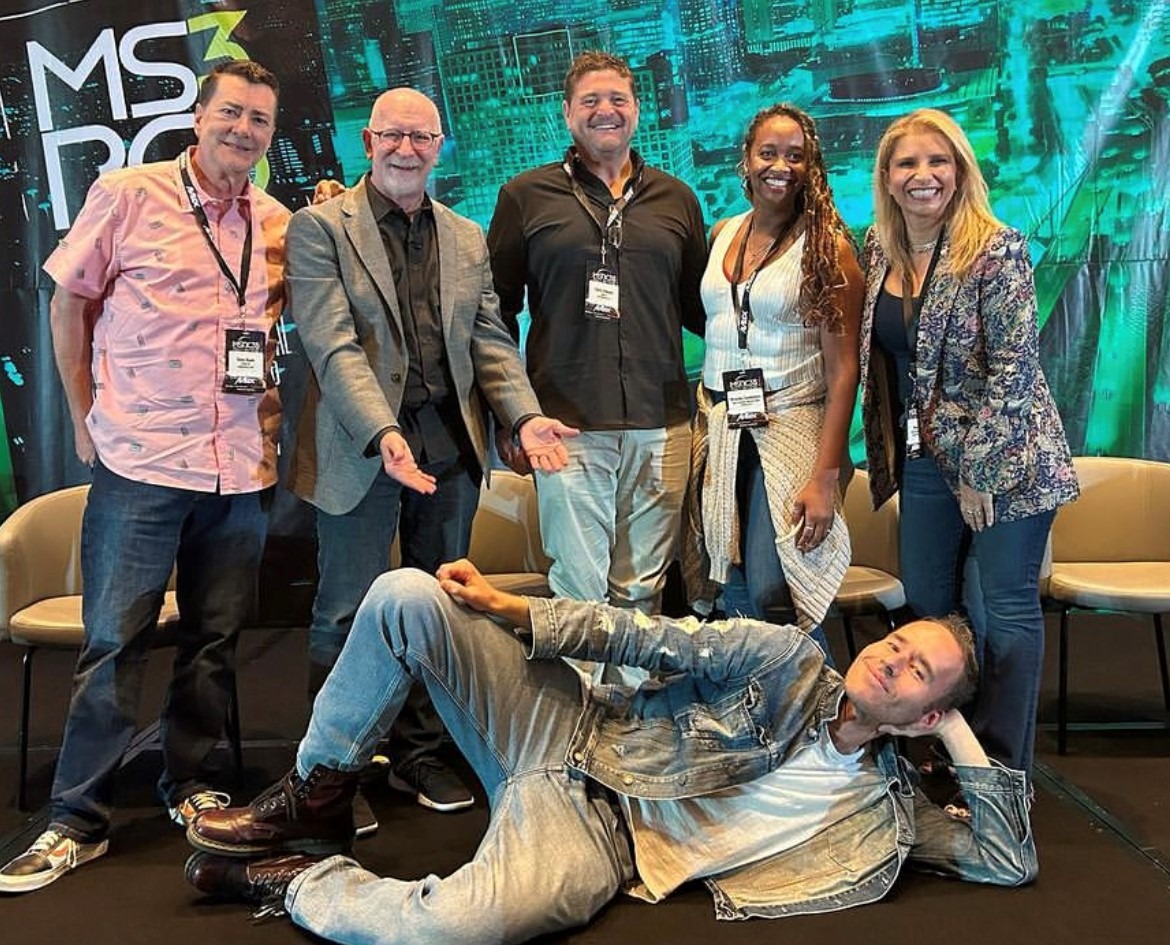
What an odd time in our business for air talent. Coming off our recent AQ5 study of commercial radio personalities, and then presenting the study at Don Anthony’s “Morning Show Boot Camp” in Dallas, I have a much better feel for the emotional state of our folks who make their living behind a mic.
It’s a contradiction. On the one hand, many on-air hosts are concerned about job security, given the lethargy in advertising and impending concerns about the coming of AI. An already insecure group of people is often feeling even more stress these days about hanging onto their jobs.
Yet, talk to programmers who are actually looking to make a hire. You’d think given all those people “on the beach,” most programmers would have a lot to pick from. But as we learned from our AQ study, that’s not always the case. This year, we had a subsample of 50 out-of-work air talent. And we asked them to give us a sense of their next move. Here’s what they told us:

As you can see on the pie chart, more than four in ten appear to be done with radio. Only three in ten are looking to get back in. So aside from trying to lure someone who’s already employed, the beach doesn’t sound like a target rich environment.
As most programmers will tell you, radio jobs aren’t all that in-demand. And that makes filling an open position less than optimal.
 It wasn’t that long ago, you’d walk into a PD’s office (especially in rock radio) and you’d see a stack of resumes (often accompanied with an audio aircheck).
It wasn’t that long ago, you’d walk into a PD’s office (especially in rock radio) and you’d see a stack of resumes (often accompanied with an audio aircheck).
The other fixture was that odd Creed award for 20 million albums sold. You may remember it because unlike a platinum record, the award looked more like an odd trophy with a little red LED light on top (like a tower light). I came to call the award the Creed “dunce cap.” As Nikki Haley might say, when I looked at it, I felt dumber.
But I digress…
Even with fewer open jobs, programmers often feel challenged to find the right talent. And many are turning to syndication. Yes, you give up some localism, but odds are, you get a quality show and you don’t even have to pay health care.
Alas, there are more syndicated shows than ever before, especially in rock/classic rock/alternative sectors. So how do you decide who to consider? And how can a somewhat newer show get on the PD radar screen and stand out in the crowd.
That’s the challenge Greg Beharrell faces everyday. His show is syndicated by YEA Networks, but if you know Greg, you know he does a lot of his own legwork, phone calling, conventioneering, and schmoozing on his own. He’s looking at markets and strategically thinking about where he could make a positive impact.
He has an interesting background, and a fascinating, quirky personality. And on many of the 60 or so stations he’s on, “The Greg Beharrell Show” airs at night. Greg is a Canadian by birth who grew up in London…Ontario, midway between Detroit and Toronto. After working for a number of Canadian stations, he joined legendary CFNY in Toronto. A few years later, he was hired by Live 105 in San Francisco, until landing at KLOS in L.A.
Greg’s syndicated show launched in 2020 and is on scores of stations in the U.S, and also Canada. And he’s looking for more.

So armed with the same tool kit everyone else has, how do you self-market a show and a personality that are….well, different? Without becoming just another resume in the stack or just another email in the inbox.
A month or so ago, he reached out to me – and apparently a number of other consultants in the business. The list included Tracy Johnson, Nails Mahoney (a talent coach from Ireland), Kevin Carter, Randy Lane, Mike McVay, and yours truly. He sent each of us a couple lines to record, of course out of context. None of us had a clue about what we were reading or why. Typical, quirky Greg Beharrell.
I thought about asking him where this was all going, but then it’s like a magician being asked to reveal how he does is tricks.
The other day, a video made its way into my Internet orbit, as well as many of yours. And the method to Greg Beharrell’s madness became clear. It’s a mock press conference where Greg’s consultant “reporters” ask him embarrassing questions and they respond to him with a dash of snark. All all the way, Greg plays the indignant, self-deprecating victim.
It’s pure Beharrell. And it gives you a real sense of his creativity, innovativeness, attitude, and of course, his content. It is NOT like anything most syndicated shows send out – usually, the basic aircheck of “greatest bits” – entertaining, but all pretty much the same. And by securing a group of consultants and talent coaches and taking US out of context, Greg has a nice piece of video people happily play and share.
Like I’m doing here.
So here’s the video:
It’s not like everything else. And as Greg explains it, that’s the point:
“I like to create things that nobody has seen. So my choice was the press conference video or my self-confidence, and I was certain either would play to big laughs.”
When I asked him for advice for someone trying to nail that first radio job or make a jump from a smaller market to a larger one, here’s his advice for getting attention:
“Always be different. Unique is important. Special content wins. Three word sentences.”
Sure makes sense. (Now he’s got me doing it, too.)
Whether it’s our station brands or our personal ones, Greg’s 3-word pieces of advice have a ring of authenticity to them (even if he made them up on the fly). The same attributes that can help personalities build their brands are similar in many ways to what sets great stations apart.
Consumers (and managers) are looking for special qualities and a good laugh is always welcome.
And a little quirk never hurts either.
Greg can be reached here and here.
- Under The Influence(rs) - March 14, 2025
- Radio’s Dilemma: Trump Or Get Trumped - March 13, 2025
- What About Bob? - March 12, 2025




Just one word: Excelent!
Thank you.
To paraphrase the late Justice Potter Stewart, you might not be able to define great radio talent, but you know it when you hear it. We in programming have to be honest and humble. As much as I loved being on the mic, I eventually realized I didn’t possess that talent, so I moved into production, where I had greater success. But I have never missed an opportunity to plug the people who do have the talent, because their success redounds to us all.
Good one, John. And I reached that very same conclusion, and ending up walking through the “research” door.
LOVE IT! And oh, I just have to share this I came across just a couple days ago. You’ll recall those novelty, comedy “mock” interviews where the questions were answered with clips of songs? (I remember a political one and one called “Mr. Jaws” with the shark being interviewed.) Cleaning up at home, I found one I made when I was a teenager! And by golly, it’s pretty darn funny if I do say so myself! Be kind, I was a kid and this was done on a home cassette/radio deck that just happened to also have a mic input, which without this wouldn’t have even been possible. I present now the first…and last…episode of Mork Spitz (obviously “Mork and Mindy” were on when this was done, and I combined Mork with “Spitz” of Mark Spitz fame because of the subject matter) with “Spitz on Sportz”!
https://drive.google.com/file/d/1J0Y-DpIDq7YhfniatSPjJ40mv9BSJJfy/view?usp=drive_link
That was fantastic and one big glaring reason why everyone on the air should have a YouTube channel. I’ve never heard his show yet just on this video I’m now super curious to hear him AND….I like him lots already before I even get to hear him. Video. Super powerful. Not sure this would have worked as well if you couldn’t see his expressions and all that.
It’s a great tool, Pat, that is generally underused by radio talent. Greg gets it, and works the visuals well.
I have the pleasure of working with Greg everyday. Yes, he is very smart, unique and wildly talented, but what most don’t know is:
He thinks like a PD; very strategic and considers every detail when it comes to his show/content.
He is very proactive and effective with sales (he’ll send me unsolicited spec spots for advertisers he hears in the market or others he wants to endorse). When he does endorsements, the clients are blown away by what he does.
Over 60 markets in three years … nothing was handed to him, he is a hustler who has earned it, and Greg is not even close to his ceiling yet.
Keith, kudos to you for recognizing Greg’s talent and potential. He’s special and has the potential to make a mark in this business – and the entertainment industry period. A number of people have commented on his facial expressions, all of which add to his persona.
THIS is how talent becomes . . talent. Greg is obviously a talent for a late night talk show replacing Fallon, Colbert or Seth. (Kimmel, you can stay.) I know this is a 2 minute clip, but stringing these together can me radio magic. In the “good old days” we had Joey Reynolds (WKBW), Barney Pip and Ron Brittain (WCFL), Dick Biondi and Chuck Buell (WLS), Wolfman Jack (everywhere) and many many more. Today you have George Noory on most every AM station that’s not carrying “Red Eye Radio”. On FM? Otto. Mation. Captain Swee Perz. Greg obviously has an incredible mind-works hard. Should every market have his show? Why not? Every competitor should develop its OWN show to compete. That’s where our industry is failing itself. KLOS and Keith Cunningham are very lucky to have Greg. The last KLOS competitor went to heaven, but I digress. Was a time when publications everywhere were talking about all of the fun stuff that radio was doing. Maybe this can inspire more of that. Thanks for this, Fred. It’s great. Now if we could only bring Phil Hendrie back to the airwaves.
A lot going on in this comment, Dave. Clearly, Greg has the chops to truly become a great personality. We’re all pulling for him.